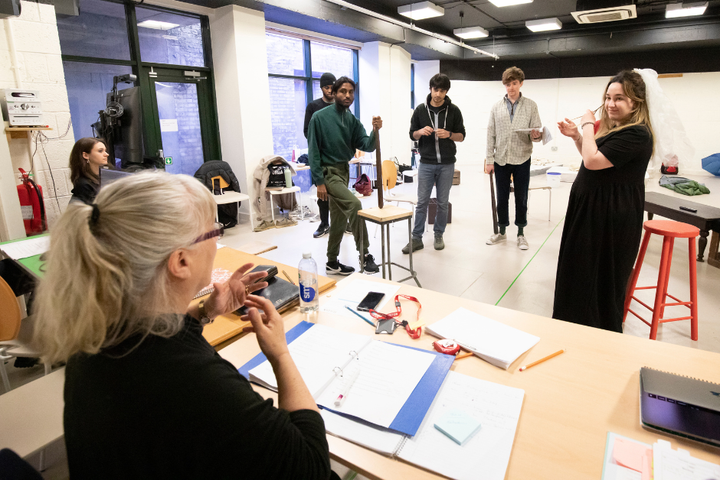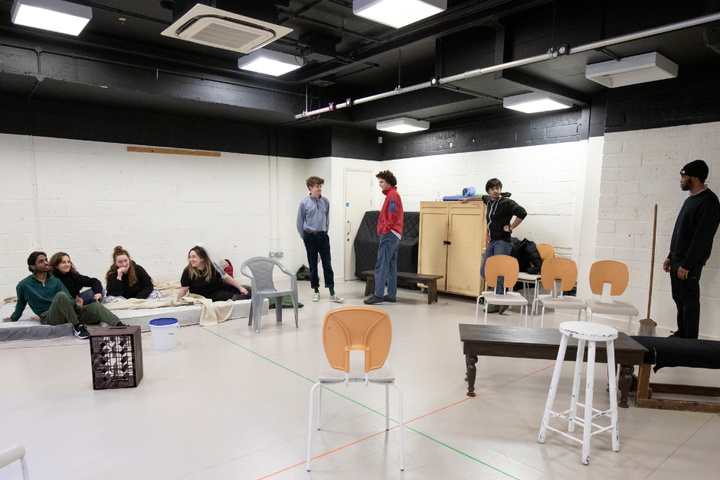"We have a responsibility to the reality of the situation": the power of Wild Cherries
Wild Cherries, written by award-winning playwright Daniel Keene, follows seven people suffering on the margins of society and their uncertain bid for freedom. Set on a cherry orchard, Keene tells the broken stories of forgotten labourers trapped in modern slavery.
We caught up with Director of Wild Cherries, Kristine Landon-Smith to learn more about the production, her work at RADA and how the play’s themes remain relevant to today’s audiences.
Tell us about the history behind Wild Cherries and why you chose to direct it.
Wild Cherries is a play by Australian author Daniel Keene and Daniel’s work is hardly produced in the UK. He is a prolific writer and with the text being sparse and very poetic, he says a lot in a very economical way – that suits me as I love writing like that. I came across his writing when I was in Australia working at the National Institute of Dramatic Art working on a play called The Serpent’s Teeth which I have directed on a number of occasions. I met Daniel about 8 months ago and he asked, ‘I have a huge body of work, why are you only ever doing The Serpent’s Teeth?’, so I looked at his body of work and I came across Wild Cherries which is about modern day exploitative labour in rural settings.
It’s very contemporary, it’s very real and it’s a terrible modern day issue. I showed it to Nona [RADA’s Associate Director and Chair of Audition Panel] who said it was wonderful so we decided to do it and it happens to be the UK premiere.
Having directed at RADA before, what inspired you to work with our students again?
I had a really great time three years ago when I directed The Laramie Project [Autumn 2019]. The students were marvellous and the support around the production is incredible. That’s because RADA trains people in Stage Management, Design, Sound, Lighting, etc – so you have a team of people who are part of the project that you don’t always get at other conservatoires. It’s great to work in collaboration with a number of students from different departments so when I was asked back, I was very happy and quick to say yes to the project.
What is it like working with the Technical students?
It is like any professional production so we have a lot of interaction and conversations around what we as a creative team are trying to achieve. I have a Stage Manager who sits beside me in rehearsals, the people operating Sound and Lighting are now in all the time.
How do Props and Design affect the production?
It impacts a lot because the physical production is an enormous thing in any work and as the Director, you have to feel how the physical production will enhance the work of the play. So in my early meetings with the Designer [Roma Farnell], she and I talked a lot about our individual ideas and the main elements we needed to capture and both of us felt very instinctively that the land is a big character in this play. So we had to get the land, the landscape, right. We’re setting it in a hot, rural landscape and we had to get that sense of ongoing fields so we decided to remove some of the seats in the stalls to nearly double the stage area as we wanted to get that sense of the land going on and on and on. We also wanted to portray the actual work task for the labourers and the crowded conditions in which they sleep, so all of those things have been carefully thought through and considered.
How is the play relevant to today's audiences?
It is absolutely relevant because we see it everywhere – it is exploitation and it’s trafficking. It’s very real and we have a responsibility to the reality of the situation so I have been very careful to try not to sentimentalise the work. We have tried to honour the situation through our process and through the research we’ve done. We are making theatre and we are talking about real themes. Theatre is a place to discuss the social and civic issues of today and you can’t dilute that too much.
What are you most excited to see on stage?
The work is very much to my sensibilities and because of the set and the music, it feels quite filmic. There are a lot of crossing over scenes and a timeframe as we go through day one, day two, day three – we see them sleep and we see them wake up. We have some sequences with no text as they sleep, then wake up, then go to work which I think is quite unusual as a lot of theatre we see these days is so text heavy with lots of noise. It’s a little unusual in the way the scenes flow between each other so if we can achieve the filmic quality of it, that’s what I’m most excited to realise.
How would you sum up Wild Cherries in three words?
Poignant, disturbing, power.
So many people don’t know that modern slavery exists and don’t realise that the word ‘slavery’ can be used for something happening today but it is. The play doesn’t do it in a really strident way but you can see as things get removed from people, their fear develops and that fear is played upon and the person in that situation becomes more and more powerless.
Wild Cherries
by Daniel Keene
Jerwood Vanbrugh Theatre
From 22 March - 1 April
Book now


